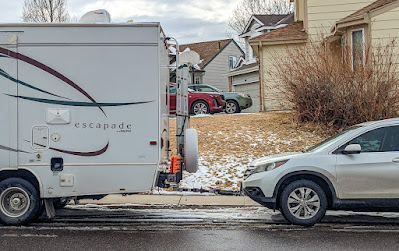Some background: When we bought the '87 Suzuki Samurai, one of the things that made it so attractive to me was that it came with Blue Ox Aladdin Tow Bars (7500lb capacity), the Sammy had a tow plate installed on it and it also had a Brake Assist device, the BX88100, to engage the Sammy's brakes when the towing vehicle's brakes are engaged, this to help both vehicles stop quickly and smoothly.
However, the PO had told me he never used the brake assist as the Sammy was so light (2000lbs +). I also ended up never using the brake assist with the Sammy and it all functioned as expected, no problems there.
Of course, now that the Sammy is history, it was time to outfit Martha's 2014 Honda CR-V for flat towing aka all four wheels on the ground.
This week we finally got serious about testing the towing of the CR-V with the VRRV. Several test sessions resulted in serious doubts about the performance of the brake assist device! The VRRV seems more than capable of stopping safely with the CR-V in tow so not a huge problem, but the law in most states says that towed vehicles weighing more than 3000 lbs must have brake assistance of some sort. The Honda CR-V weighs about 3500 lbs!
Several consultations with the ever patient and knowledgeable RichardM, finally drove the concept of how the brake assist is supposed to function into my thick head. I had it all wrong you see, I thought it was supposed to work one way but it turns out to be completely different. So, not knowing, I didn't know what to look for during testing.
Just for your edification and mine: here's a pic of the vehicles hooked together from a previous posting: LINK
Concept of operation so that others don't have my mistaken beliefs re how this device works!
As the towing vehicle slows , the towed vehicle pushes on the tow bars because of its inertia, the tow bars push on the Brake Assist, which then is supposed to move forward slightly. There's a spring inside you see, which compresses forward pushing on one of two sets of pulleys, which in turn as they rotate/move, pull back on the cable that's connected to the towed vehicle's brake pedal, actuating it, and causing the towed vehicles brakes to actuate proportionally, helping to slow things down.
As soon as the pressure stops and the towing vehicle moves forward again, inertia forces the auto stop's inner pulley components backward; which then release the cable amount they'd pulled in, which relieves the pulling pressure on the brake pedal's cable on the towed vehicle. The towed vehicle's brakes are now off till the next stop.
Some thorough reading/studying of the BX88100's owners/service manual (with many patient answers and explanations from RichardM via phone/textig); finally allowed me to understand how to take it apart, service it and put it back together correctly!
Let's just say, I discovered whomever had last assembled the brake assist aka auto stop, didn't do it correctly and the pulley mechanisms were stuck/binding!
Here's a closer look at the Brake Assist device. Note: the cable conduit shown below on drive's side of the device had been mistakenly mounted on the passenger side!
Here's how the pulley components came out, with the device oriented as shown above:




.jpg)

2 comments:
Good job! You now have working brakes with $0 spent! You may want to grease the RV receiver as the brake assist device slowly does slide inside the receiver.
All the credit belongs with you RichardM! I'll grease as recommended, also tape close the opening at back of rv hitch that let dirt into rear of the autostop.
Post a Comment